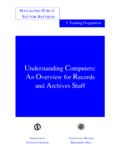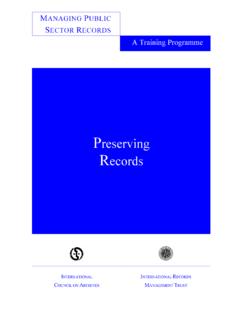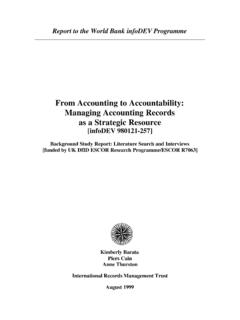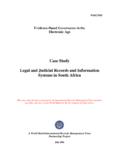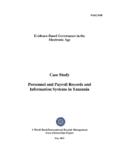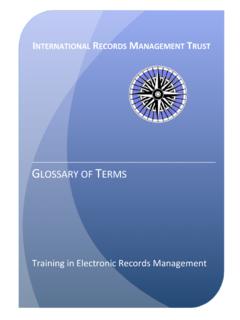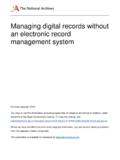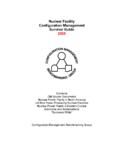Transcription of Right to Information - International Records …
1 Right to InformationManaging Records and Information for Transparent, Accountable, and Inclusive Governance in the Digital Environment: Lessons from Nordic CountriesAnne ThurstonInternational Records Management TrustVictoria L. LemieuxSeries General Editorii managing Records and Information for Transparent, Accountable, and Inclusive Governance in the Digital Era: Lessons from Nordic CountriesBy Anne Thurston, International Records Management TrustDisclaimerThe findings, interpretations, and conclusions expressed herein are those of the author(s) and do not necessarily reflect the views of the Executive Directors of the International Bank for Reconstruction and Development/The World Bank or the governments they World Bank does not guarantee the accuracy of the data included in this work.
2 The bound-aries, colors, denominations, and other Information shown on any map in this work do not imply any judgment on the part of The World Bank concerning the legal status of any territory or the endorsement or acceptance of such boundaries. 2015 The World Bank1818 H Street NW Washington DC 20433 Telephone: iiiRight to Information SeriesThe Right to Information Series brings forward current and ongoing research on issues related to transparency and the Right to Information . It aims to provide a range of Information on policy, practice, experience, and frontier issues related to public sector openness and transparency, including the underlying functions and outcomes of open government efforts.
3 Project Leader and Right to Information Series General Editor: Victoria Lemieux, Papers Series Editor: Stephanie E. Trapnell, Titles in the Right to Information SeriesRight to Information : Case Studies on Implementation (2014), edited by Stephanie E. TrapnellRight to Information : Requests and Appeals Data in RTI Systems (2014), by Jesse Worker with Carole ExcellRight to Information : Recent spread of RTI legislation (2014), by Toby MendelRight to Information : Identifying Drivers of Effectiveness in Implementation (2014), by Stephanie E.
4 Trapnell and Victoria L. LemieuxDesigning Right to Information Laws for Effective Implementation (2015), by Toby MendelManaging Records and Information for Transparent, Accountable and Inclusive Governance in the Digital Era (2015), by Anne ThurstonGuide to the Implementation of Right to Information Laws (2015), by Victoria L. Lemieux and Stephanie E. Trapnell vContentsRight to Information Series ..iiiAcknowledgments ..viiOverview ..1 Introduction ..1 Harmonizing Goals for Openness, Digital Governance, and High Quality Digital Information .
5 2 High Quality Digital Information ..3 Key Issues for the Future ..5 Estonia: Information Governance and the Information Society ..7 Introduction ..7 Digital Governance Environment ..8 Legal Framework ..9 Administrative Framework ..10 The Move to Information Governance ..13 Challenges ..14 Conclusion ..16 Appendix A. List of Key Records Management Standards Used in Estonia ..16 Finland: Transparency and Citizen Participation ..19 Introduction ..19 Legal Framework ..20 Administrative Framework.
6 21 Challenges ..27 Conclusion ..28 Norway: Information Integrity and Access to Information ..29 Introduction ..29 Legal Framework ..30 Administrative Framework ..31 Challenges .. of Relevant International Standards ..39 Records Management/ Information Governance and Risk Related Standards ..39 Data Management Standards ..45 viiAcknowledgmentsThis study could not have been completed without the warm and generous support of officials in relevant agencies across the three countries studied Estonia, Finland, and Norway.
7 They agreed to be interviewed, patiently answered questions, provided valuable reference material, and reviewed drafts of the studies, correcting any misconceptions that they identified. Their open and honest assessment of challenges of providing high quality Information in the digital environment has brought a fresh perspective to a key aspect of achieving transparency, account-ability, and social inclusion that is often overlooked. Their assistance is deeply This set of three case studies explores the intersection of openness, digital governance, and high quality Information in Estonia,1 Finland, and Norway with the aim of identifying lessons that will support the same objectives in lower resource countries.
8 Openness, a key aspect of the International agenda for increasing transparency and accountability, for reducing public sec-tor corruption, and for strengthening economic performance, rests on the principle that citizens have a Right to know what their governments are doing and to benefit from using government Information . Goals for open, accountable, and inclusive governance rest on the assumption that trustworthy Information is available and can be shared meaningfully through strategies for digital governance.
9 This assumption needs to be examined. Does reliable and complete Information exist across lower resource countries? Can it be accessed readily? Will it survive through time?The three Nordic countries are distinguished by and highly respected for their commitment to openness and social justice, low levels of corruption, and advanced use of technology to support economic development and high quality customer service provision. These countries also are distinguished by their recognition that high quality Information is an essential resource for national development and that managing digital Records and data effectively is an essential state function.
10 Their experience offers valuable insights into the means of meeting International expectations for using Information to support openness and economic growth. The case studies seek to answer four basic questions: What is involved in managing digital Information ? What are the benefits? What are the risks of not managing this resource? What are the challenges for the future?2 managing Records AND Information IN THE DIGITAL ENVIRONMENT: LESSONS FROM NORDIC COUNTRIESH armonizing Goals for Openness, Digital Governance, and High Quality Digital Information Nordic societies share the political goal of encouraging strong social cohesion based on the core values of equal opportunities, social solidarity, and security for all.

